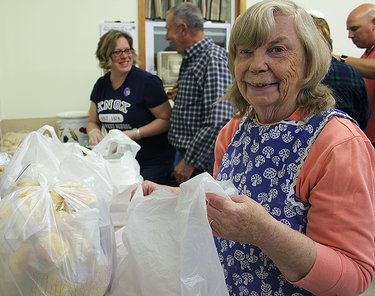Election Night dinner, a century-old Hilltown tradition, is no more
KNOX — A chicken dinner that was held every Election Night for 100 years — where political rivals could sit down and eat a meal together — has run its course.
Last year on Election Night, as rain fell off the Hill and snow covered the parked cars in Knox, the church hall was bustling both in and out of the kitchen. Patrons waited in church pews to be called to their tables and, to the side, crafts were sold to raise funds.
Organizers of the dinner at the Knox Reformed Church have decided to look for other means to raise money, said Sandra Quay, who has served as one of the many volunteers at the dinner for half of a century.
“One hundred years was a good run,” she said.
Last Monday, the church held a meeting and discussed other options. Quay said it was decided to “pass the torch” to a younger generation of congregants — she said nine people joined the church this year — who would meet in January to decide on how to raise money at an event in April. The decision was met with acceptance, said Quay.
“The majority of people were sad because they were going to give up the chicken salad,” she said.
Sandra Quay was about 10 years old when she joined volunteers at the church by waitressing at the chicken dinner, eventually moving up to different positions.
“It was just getting to know people that came to us year after year,” she recalled, describing how she would come to know patrons down to their favorite kind of pie.
The first dinner was held on Election Night at the Knox Reformed Church in 1917, she said. Back then, live chickens were taken to the church, and were killed, plucked, and butchered there.
“Over the years, things have changed,” Quay said. Not just items on the menu, but schedules — many of the volunteers cannot take time off from work to cook hundreds of meals for three days.
“One-hundred years ago, women did not work outside the house,” she said. Some meals, she said, take days or even a week to prepare, such as the church’s chicken salad. Volunteers came in at 4:30 a.m. the day before the dinner to debone and cook chicken breasts, wings, and thighs. The next morning, volunteers peeled potatoes for “real” mashed potatoes.
Quay added that “take-out” meals, wrapped up and brought home, increased over the years, while the numbers of diners in attendance declined. Dinners were reserved, but Quay said no one who showed up was ever turned away.
The dinners were served in three rounds: one group at 4:30, one at 5:30, and one at 6:30 p.m. Quay said originally there would be 11 tables filled with 10 people for every round — 330 meals in all. In recent years, eight tables with 10 diners were filled for only one round, for just 80 meals.
Quay said patrons came from all over the Hilltowns as well as Reformed churches in Albany and Schenectady in previous years.
Quay does not know why Election Night was chosen for the church’s annual feast. She surmised there was probably a need for ready-made meals on Election Day, recalling how meals would be taken to poll workers then.
Quay thanks everyone for their support over the years. She recalled some special regulars:
— A piano player who, for years, would perform for half an hour in the church after his meal;
— Porter Beitelman and his wife, who got a free meal after attending for 50 years;
— A volunteer who cut pies for 40 years; and
— The late Jennie Stevens, who died in May at 99, but had collected tickets for the event for the last 60 years.
At least 50 people volunteered last year, said Quay, noting that volunteers got to share a meal after all the guests left for the night. Leftovers would be donated to the church’s food pantry.
“It was just a group of people who worked well together,” she concluded.


